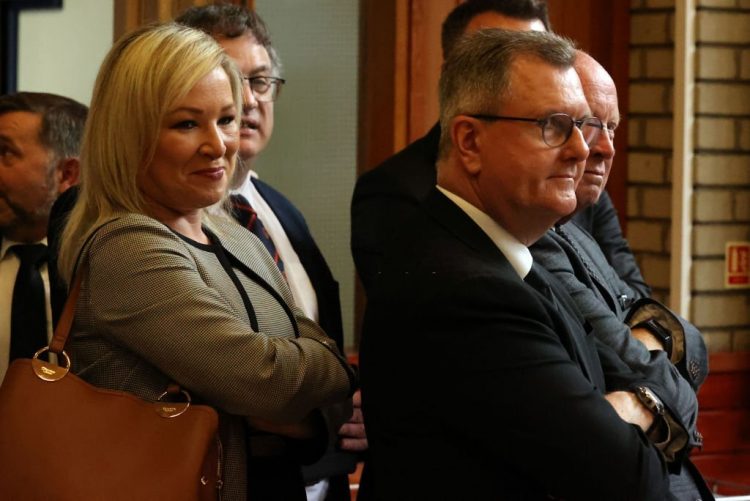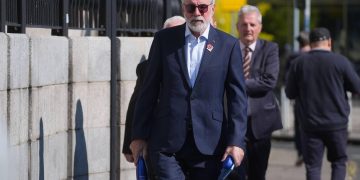Northern Ireland is headed for an unwanted snap election. Irish lawmakers failed on Thursday to break a political deadlock over Britain’s departure from the European Union, which has shaken the island’s power-sharing structure. Northern Ireland has been without a functioning government since February after the DUP refused to participate in the executive protest over the Northern Ireland Protocol in the Brexit deal. Members of the Stormont failed to elect a Speaker in their meeting.
The election could be the first step towards reviving a power-sharing government between Irish nationalists and British unionists, which has been undecided since the election in May. DUP leader, Geoffrey Donaldson, said his party would not agree to nominate an executive until “decisive action is taken to remove barriers to trade within our country and restore our place in the UK single market”.
DUP’s Obstructive
Efforts by Northern Ireland’s Democratic Unionist Party to nominate a new speaker have failed as part of its protest against post-Brexit rules that the party sees as undermining Northern Ireland’s British identity. Sinn Féin and the Alliance party have called a special sitting of Stormont to try to elect a new speaker – a prerequisite before an executive can be appointed – but the DUP will almost certainly use its veto to block it.
Northern Ireland has not had a functioning regional government for months. If no agreement is reached in the current disputes, Rishi Sunak, the new UK Prime Minister, will have to call a new election. As such, Northern Ireland is heading for a recent general election due to political deadlock over its status due to Brexit. However, DUP leader said: “He does not believe an election will get us any faster to the solution we need.” He noted, however, that his party is open to a new vote.
In regional elections in May, the Irish nationalist party Sinn Fein won a majority for the first time in Northern Ireland’s history. However, the DUP boycotts Parliament as it rejects a post-Brexit customs regime for Northern Ireland. Unionists fear this will lead to the region becoming increasingly isolated from the rest of the UK.
NI Protocol and DUP’s Carping
Through the Northern Ireland Protocol, the region will remain part of the European single market even after Brexit. Still, goods will be controlled between the UK and Northern Ireland. The British government initially passed the regulation to prevent control between the EU country of Ireland and Northern Ireland, as it could jeopardise the peace process in the formerly troubled region. However, since then, the London government has pressured Brussels to withdraw the protocol and passed laws to circumvent it.
The biggest unionist party wants to overturn the post-Brexit Irish Sea border that puts checks on goods entering the region from Great Britain, which is part of the Northern Ireland protocol. Many unionists see this as a threat to the region’s position in the UK and a slippery slope towards a united Ireland. However, the agreement has created a de facto customs border in the Irish Sea, separating Northern Ireland from the rest of the UK. The EU Commission has threatened to refer the UK to the European Court of Justice if it repeals the regulation. The DUP wants the protocol overhauled before any resumption of devolved government.
What Is Donaldson Looking for?
DUP leader Donaldson said he had tried to convince Heaton Harris that there was a need to “clear away the debris of protocol”. According to him, an election will not do much to change the deadlock. In a tweet, Sinn Fein vice leader Michelle O’Neill called on the DUP to stop blocking the formation of an executive and work with everyone else.
“I have made it clear that if the executive is not formed by November 6, I will hold an election,” said Chris Heaton Harris, the head of the Northern Ireland department in the British government. “Time is running out, and the people of Northern Ireland deserve local decision-makers and an executive who can respond to the issues facing people, families and communities across Northern Ireland in these challenging times.”
Political Consultation
The political impasse in Northern Ireland was also part of a phone conversation between Irish Prime Minister Michael Martin and new British Prime Minister Rishi Sunak. Sunak hoped for a negotiated solution and that all parties would deal with the current challenges with pragmatism and good faith.
Donaldson, who met Heaton-Harris later in Belfast, insisted that UK Government could deliver cost-of-living support to people in Northern Ireland despite the ongoing absence of an executive. “Let me be clear: my party will work day and night to ensure – at Westminster and through our ministers at #Stormont – that people get the help they need, households and businesses alike in Northern Ireland get the support that they require to help them with rising energy costs and to meet the cost of living at this time,” he said. After the meetings with the DUP and Sinn Féin, Heaton Harris said he had reiterated the importance of restoring stable government at #Stormont. He said he had also listened to concerns around rising energy prices and said he emphasised the UK government’s commitment to taking action to support people and businesses in Northern Ireland with their bills.
Legal Victory
Sinn Fein recently won a historic and decisive victory in the Northern Ireland parliamentary elections and most of the parliamentary seats in Belfast. This nationalist and republican party, strongly opposed to Brexit, won the most hearts by winning 27 seats against the 24 seats won by DUP. In the May elections, the Sinn Fein party – which seeks the unification of Northern Ireland with Southern Ireland – won the elections with 90 seats, ousting the old pro-British Democratic Unionist party known as the DUP.
Conclusion
The DUP is blocking the functioning of the power-sharing institutions in Belfast as part of the party’s protest against Brexit’s Northern Ireland Protocol. Political opponents have heavily criticised the DUP boycott, insisting it hampers efforts to support families struggling amid the cost-of-living crisis.
Sinn Féin leader Michelle O’Neill accused the DUP of trying to turn back time to “the past”, saying: “People need to know we have their backs.” But DUP MP Paul Givan believes his party’s unionist views are being “disrespected”. He said power sharing should be by “agreement and consent”, not contempt. Politicians from other parties expressed dismay at the political deadlock, as people in Northern Ireland, like the rest of the British peninsula, struggle with rising food and energy prices. Matthew O’Toole, from the centrist nationalist Social Democratic and Labour Party, said: “This event was disappointing and shameful. It’s not just a shame that people see the government in this state amid a cost-of-living emergency. “It is a huge and profound strategic error for Unionism to allow Parliament to sit empty and silent while the people are fighting.” The solution itself has become a political crisis, with Unionist politicians refusing to form a government because they see the customs checks as undermining British identity and Northern Ireland’s place in the UK. While the DUP wants the Brexit deal to be scrapped, most other parties in Northern Ireland are in favour of it.





























